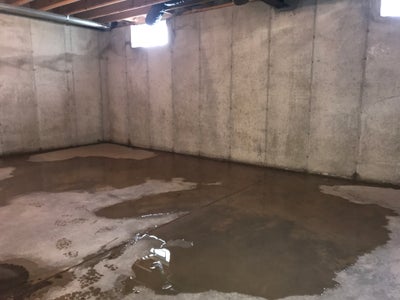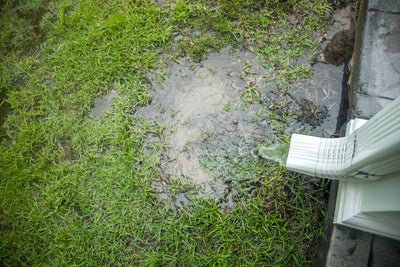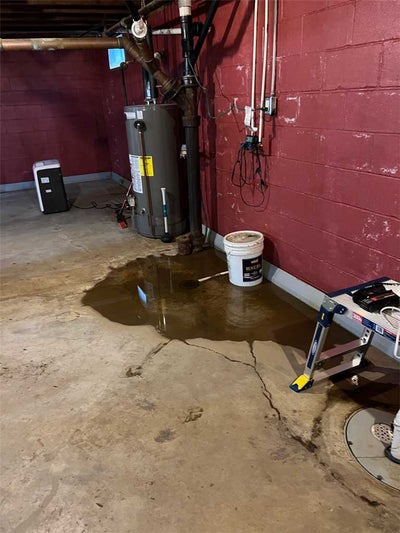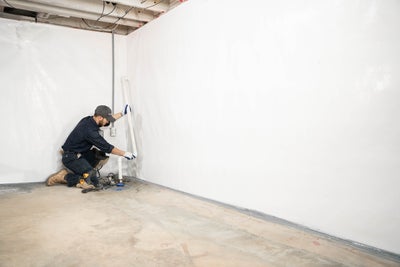9 Causes of a Leaking Basement

Have you ever gone down to your basement and noticed a water puddle on the floor, a trickle on the wall, or damp, musty air? Many homeowners believe these nuisances simply come with the territory of owning a house with a basement.
Though common, any amount of water or moisture in your basement is harmful, leading to mold growth and potential foundation issues. Addressing the root of the problem is the key to creating a safer and healthier home.
This page explores the common causes of basement leaks, what you can do to stop them, and how the basement waterproofing experts at Groundworks can help.
Why is My Basement Leaking?
Basement leaks originate from various sources, including these nine common causes:
1. Failing Damp Proofing and Damaged Footing Drains
During your home’s construction, damp proofing or a tar coating is applied to the exterior basement walls, and footing drains are placed in the ground to prevent water and vapor intrusion. While damp proofing slows down water vapor flow, it fails to fully protect against leaks. Over time, this coating degrades, and footing drains can clog, leading to basement leaks.

2. Drainage Issues
Other exterior drainage issues can also be at play. Improper grading (landscaping that slopes down and towards your house), clogged gutters, short downspouts, or blocked window wells can cause water to pool around a foundation, increasing the risk of leaks.
3. Soil Composition
The area’s clay-rich soil easily becomes oversaturated during heavy precipitation, and the water has nowhere else to go. Water follows the path of least resistance, often ending up in the basement. It also exerts significant force upon the basement walls, leading to cracks and leaks.
4. Rain and Snowmelt
Heavy precipitation throughout the year—varying amounts of rain and snow— can drench the soil, generating hydrostatic pressure that forces water through basement walls and floors.
5. The Clay Bowl Effect
Soil is replaced after your foundation and walls are built. Backfilled soil is not as tightly packed as the rest of the soil on your property, so it absorbs more water. It also forms a “clay bowl” and an artificial water table next to the basement, leading to leaks.
6. Hydrostatic Pressure
In the same vein, as groundwater surrounding your foundation builds up within clay soil, it creates pressure on the basement walls, forcing it to seep through cracks and wall joints. As hydrostatic pressure fluctuates, it stresses basement walls, causing movement that creates cracks.
7. Freeze-Thaw Cycles
When water seeps into wall cracks, it expands and contracts as temperatures fluctuate. This can lead to foundation damage and create paths for water to enter the basement.
8. Porous Concrete Walls
Concrete is a porous material that absorbs water through tiny pores. When water accumulates behind the walls, it fills these pores, causing leaks.

9. Internal Plumbing Leaks
While most causes come from outside your house, problems can easily arise inside. Plumbing pipes can burst, appliances like washers and water heaters can leak, and sump pumps can malfunction, all leading to unwanted water in your home.
You can learn more about basement leaks by watching this video.
How Basement Leaks Affect Your Home
Basement leaks can create numerous problems for your home, leading to frustration and costly repairs. Here are some of the adverse effects a wet basement can have on your home:
- Foundation damage
- Mold growth and poor indoor air quality
- Ruined possessions and furniture
- Lowered home value
- Increased risk of pest infestations
- Elevated energy bills due to higher humidity levels
It’s crucial to address basement leaks promptly to prevent these issues from arising or worsening.
7 Effective Solutions for Repairing and Preventing Basement Leaks
Avoid future headaches and unsafe living conditions with these effective repair solutions:

- Functioning gutters and downspouts
- Proper landscape grading
- Interior drainage
- Sump pumps
- Wall vapor barriers
- Dehumidifiers
- Wall repair and reinforcement
Every home is unique and requires its own customized solutions. For additional information about these and other strategies, read our article about how to stop water leaking into your basement.
FAQs
Signs of a leaky basement include puddles of water, water stains, efflorescence (salt deposits), musty odors, and visible cracks in foundation walls or floors. Don’t let these issues fester and cause additional problems. Contact a basement waterproofing professional like Groundworks as soon as possible for a thorough evaluation and lasting repairs.
Yes, even minor moisture problems should be addressed promptly. Moisture indicates a pathway for water to enter your basement. Ignoring small issues allows them to worsen, potentially leading to significant structural damage, mold growth, and costly repairs down the road.
While some minor repairs, like sealing small cracks, might offer temporary relief, we do not recommend tackling basement waterproofing yourself. Waterproofing requires a professional assessment to identify the source and extent of the problem, as well as the right expertise and specialized equipment to implement long-lasting solutions.
Contact Groundworks for Lasting Basement Waterproofing!

Basement leaks occur for various reasons, so it’s crucial to pinpoint the exact cause and address it at the source. For lasting basement waterproofing solutions you can count on, trust the experienced team at Groundworks.
We have served areas throughout Northern and Southern Alberta for more than 30 years. Homeowners know they can rely on us for thorough, free inspections, customized repairs, and commitment to excellence. Contact us today to learn more and book your complimentary assessment!